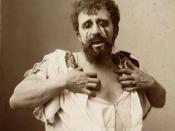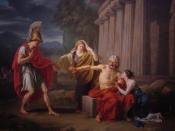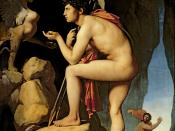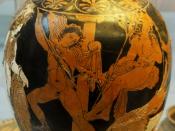Daniel Nierenberg Comparative Essay 11-20-01 "Oedipus Rex" & "Antigone" It is only natural that an author use similar vessels of literature, such as figurative language, literary devices, and elements in his/her work. It is even more apparent between works that are connected by character, time, and theme. Sophocles did this when he wrote "Oedipus Rex" and "Antigone". When comparing the two pieces, it becomes evident that very similar vessels connected these very different plays.
Sophocles uses a specific type of figurative language in both pieces known as hamartia. Hamartia is a characters flaw. The flaw often leads to a major downfall by its owner. In both "Oedipus Rex" and "Antigone", there are three reoccurring hamartias: hubris, irrationality, and unyielding stubbornness. When speaking of hubris, the characters Oedipus and Antigone come to mind. Hubris is pride or an extreme sense of self-admiration. Oedipus is quoted saying such things as, "I, Oedipus, who all men call great".
His hubris clouds his vision and prevents him from seeing things as they are. Oedipus takes on the act of finding out who the murderer of the king is but when all the evidence points to him, he cannot see it because of his arrogance. Antigone, Oedipus' daughter, has the same character flaw. She is arrogant and as power hungry as Oedipus was. She decides to go against Creon's decry and bury her traitorous brother. Antigone believes herself to be so high above others, she even says she's above the king himself. "Creon is not strong enough to stand in my way". It appears that Antigone wants to bury her brother so she can become a martyr. She tells her sister, Ismene, not to help her so she can get all the credit of defying the king and doing what is religiously right.
Irrationality is evident in both works as well. We see it first with Oedipus. We see him not listening to or acting according to reason. Oedipus blames Creon for the murder because Creon was the one who recommended Teriesias to Oedipus. When Teriesias began to say things to Oedipus that he didn't like, he assumed that Creon told the soothsayer to say these things. We also see it at the end when the truth finally hits the tragic hero. He rushes into the castle looking for Jocasta and "rips [the doors] off the hinges".
In Antigone, Creon contains the most irrationality. When he is talking with his son, Haimon, he says he is going to punish both Antigone and Ismene. But Ismene never did anything to break Creon's law. A huge parallelism between Oedipus and Creon is their scenes with Teriesias. Creon gets as bent out of shape as Oedipus, mainly because he does not want to hear what is in store for him.
The third hamartia is unyielding stubbornness. Once again Oedipus shows up as a prime candidate. As stated before, he just doesn't put all the clues together to find he murdered the king. Jocasta even says, "In form you look like Laius." Even when everyone has figured it out, Oedipus turns to the newly horrified Jocasta and recites the line that say something to degree of don't worry, I may be a slave but you will not be affected. This statement emphasizes his stubbornness simply because he is the last character to figure it out.
Creon best shows the unyielding stubbornness in "Antigone". He refuses to allow Antigone to love no matter what happens, simply because he doesn't want to go against what he said. Haimon tries to reason with Creon by telling him that it's ok if he changes his mind. He goes on to say that the people believe Antigone did what she had to do and that they are afraid of the king's temper. After all this Creon still won't change his mind. In response to this unyielding temperament, Haimon says that he will take his own life if Antigone died. And yet Creon still doesn't change.
One major literary device Sophocles used to tie the different play together was sins of the father. Often times when a tragic hero reaches his/her catharsis, if their doings have been so terrible, they will curse their line so that the evil will stop. In "Oedipus Rex", Oedipus, once he finds that that he has killed his father and, the king, and has entered the bed of his own mother, he curses his four children. ""æto waste away in barrenness, unmarried". Sophocles followed through with the curse in "Antigone". We see that Oedipus' line ends in this piece. Ismene, the youngest daughter, is so traumatized by the events in "Oedipus Rex" that she becomes a priestess and therefore will never have children. The two sons, Polyneices and Eteocles, wind up dying at the hands of one another in a great civil war. As for Antigone, her death is the worst of all. Although in "Antigone", Sophocles establishes a relationship between Haimon and Antigone, Antigone pays the ultimate price for trying to bury her brother. One cannot ignore that fact that Creon was Oedipus' uncle/brother. Therefore it is safe to assume that with the death of Haimon, there is no hope for even the slightest bit of Oedipus' blood to be passed on. And thus, the cycle of sins of the father is complete.
Sophocles' plays each have a noble/tragic hero as the main character. The definition of a tragic hero, according to Aristotle, is a man who is neither good nor bad, whose misfortune arises from frailty or error. They must be prosperous and well known. The tragic hero must fall in front of our eyes. The hero must start off high, fall, and at the end rise up higher than before. A noble hero is the same except he/she does not have as many flaws as the tragic hero.
Oedipus was, of course, a tragic hero. Sophocles first describes him as a good and just king. Oedipus saves them from the Sphinx by solving the riddle. When he first takes on the mission to find the killer and purge the land of the plague, he tells Creon to let the people know of the information he has found. But quickly before our eyes, we see Oedipus' hamartias shine brighter that those good qualities in the beginning. He soon falls to a level foreshadowed and hinted throughout the work, whereupon after his anagnorisis, or awakening, comes to his catharsis. He purges his guilt by dashing out his eyes, following through with his curse of banishment, apologizes to Creon, and curses his children. Through this he gains humility, loses his hubris, and even though he blinds himself, he winds up seeing more than more "seeing" people.
The tragic hero in Antigone is indubitably Creon. Like his nephew/brother, Creon has become the king and the reader remembers his good nature from the previous work. But like Oedipus, he falls before like a child taking his first steps. What makes Sophocles' pieces more interesting is that he falls because of the exact same hamartias as Oedipus. The author even repeats some of the dialogue as if he was trying to emphasize the parallelism between the two. The reader/audience member is introduced to Creon's thirst for power in "Antigone". This thirst was non-existent is "Oedipus Rex". Until Creon became king, he had no political ambitions. He even stated that he liked the earlier triumverant because he reaped the benefits without the hassle and responsibility. In "Antigone", Creon refuses to bend his word and let Antigone live. Creon's anagnorisis occurs much faster than Oedipus' did. The Chorus tries to reason with Creon telling him that Teriesias might be old but he has never been wrong. Creon quickly realizes this and decides to push away his pride and let Antigone live. As part of Creon's catharsis, he loses the lives of Antigone, his son, and his wife. By the time Creon had got to Antigone's tomb, she had already hung herself. Haimon, who was weeping at her body, decides to take his life if he couldn't be with Antigone in this world. When Haimon's mother, Eurydice, learns of his death, she hangs herself just as Jocasta did in "Oedipus Rex". Once all this is made apparent to Creon, he declares that he never wants to see the light of the sun and is lead away just as Oedipus is in the first work.
"Oedipus Rex" and "Antigone" are enhanced by Sophocles' use of such similar techniques in such different, but connected plays.





